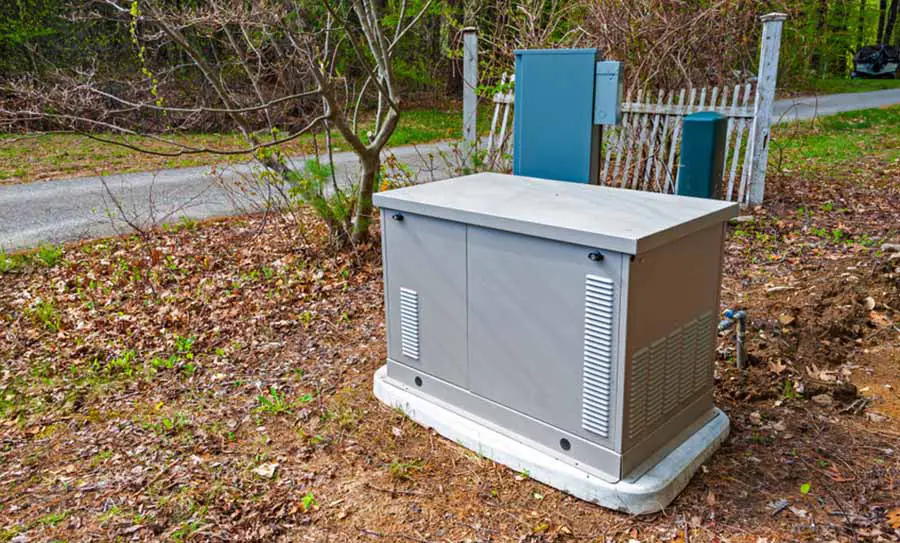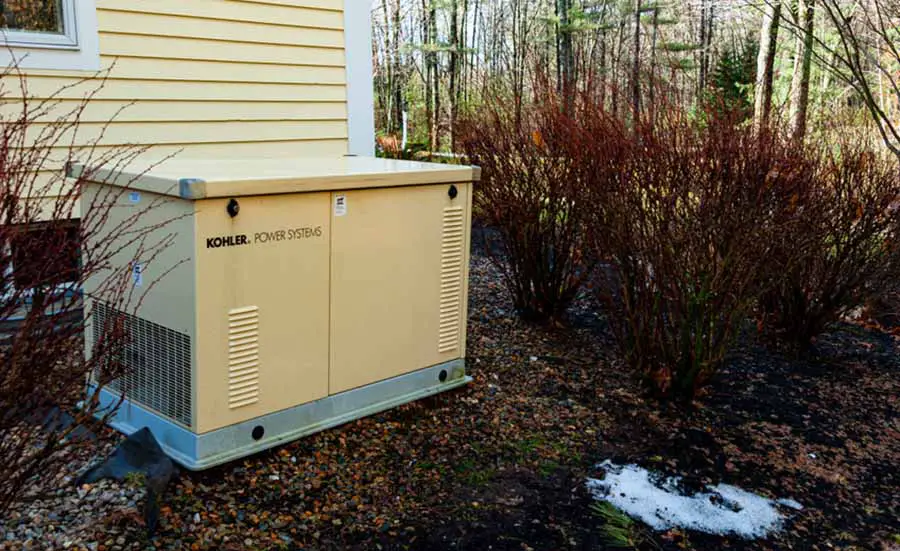
The best time to buy a whole house generator varies from one homeowner to another. And you can determine whether it’s the best time for you, depending on several factors.
Ideally, you should buy a whole house generator when they are not in high demand. Purchasing a generator right after hurricane season or during nice weather can get you a price discount. During extreme weather events or before hurricane season, generators are in high demand and more expensive.
You must buy a whole house generator at the right time. That way, you can continue to meet all your electrical needs without spending more than you should. This article discusses what installing a whole-home generator involves and factors to consider before buying one.
Are Whole House Generators Worth the Investment?
A whole house generator is also known as a standby generator. It is named thus, for a reason.
The main function of a standby generator is to maintain the power in your home when there is a blackout. That means that it will maintain the operation of your refrigerator, air conditioners, lights, and other appliances and not just keep them running.
Hence, having a standby generator helps you with challenges that can occur whenever the electricity is out. Since we cannot control the electricity provided, a backup will always be an investment in emergencies and power failures.
Factors to Consider Before Buying a Whole House Generator
The best time to buy a whole house generator is when you have considered all the factors and have all the relevant information to decide correctly.
Below are some of the factors you should consider when deciding on a whole house generator.
- Your power needs
- Your budget
- The time of the year
- Your proximity to utilities
- Your current energy costs
- What you are losing when power fails
- Your preferred brand’s availability
- Other activities taking place in your home
- Local rules and regulations
1. Your Power Needs
You must think about your home’s electrical requirements and compare them to how much power you are getting at the moment.
The U.S. is said to have more power outages than any other developed country. There are several reasons for this. The primary reason is the extreme weather events, including hurricanes, heat waves, and windstorms, which caused over 1.3 billion outage hours in 2020 alone. These weather-related events account for about 70% of all power outages across the country.
But that’s not all. Aging power grids are also an issue. They are more vulnerable to weather issues and experience more stress due to overloads and compromised efficiency. As a result, power outages keep occurring.
If you deal with at least three blackouts each year in your home and power outages lasting for several hours each time, it may indicate that you are not receiving as much power as you need.
It could be because your local grid is overloaded or your area experiences many extreme weather events. But whatever the reason, the regular power outages you deal with may necessitate the purchase of a whole-house generator to ensure you have power when you need it.
On average, Americans consume 10,715kW per household per year, which translates to about 893kW monthly. And this energy consumption is spread across many electronic items with different energy needs.
Therefore, you must have a basic idea of what items you want to continue to operate during a power outage and their average energy consumption rates. And then, you can determine your next move concerning generators.
2. Your Budget
Because whole-house generators can power your entire residential property, they don’t come cheap. So, the right time to buy a whole house generator is when your budget can accommodate its purchase and installation.
To get a decent standby generator, expect to pay anywhere from $10,000 to $20,000 on average to buy one of these pieces of equipment. However, your daily electricity requirements and the size of your home will also influence the cost. Generally, the more items you have that use electricity and the larger your home, the more power you will need and thus, the more expensive your whole house generator will be.
The installation costs are also worth considering. Research shows that it costs anywhere from $500 to $3,000 to install a whole house generator.
Also, you will need to put up a concrete pad on which the generator can stand if you don’t have it. And that could cost as much as $75 per square foot. In addition, you will need permits, which may require you to spend $50 to $200 on average.
Maintenance costs are also worth considering, even though whole house generators are usually low maintenance. You will need to spend another $165 to $485 annually to repair and maintain it.
While that cost is pretty low, it would be an added expense you cannot afford if you are struggling with debt. So, you may want to shelve the thought of buying a standby generator until you can afford to keep it functional for the long term.
3. The Time of the Year
The law of demand and supply will determine your ability to purchase it at a specific time. Generally, the higher the demand for generators, the higher the buying price will be. And if the price is too high, it may put the generator beyond your reach, thus forcing you to compromise on what you want or postpone the purchase until you can afford what you desire.
Ideally, it would help if you bought a standby generator when it’s not in demand, such as at the end of the hurricane season. When everyone is panic-buying before or during an extreme weather event, you should be far away from the stores. Therefore, early fall or spring is an ideal time for purchasing a whole-home generator.
Store owners tend to discount items when their usefulness is at an all-time low. And that enables you to get significant discounts as high as 50% that could save you a lot of money. You can then redirect these savings into offsetting the installation costs.
4. Your Proximity to Utilities
You must determine how far you are from utilities, such as gas and the electrical grid. That’s because it will affect your choice of generator for powering up your entire home.
For example, if you have a generator that uses natural gas as fuel, your home needs to be close to a natural gas line so you can use it as your fuel source. If your house does not connect to the gas grid, you can either bring gas to your home or opt for a different whole house generator.
If you opt to get connected to the gas grid, expect to pay an additional $12 to $25 per linear foot. How far you are from the existing network will determine how much you pay. But it would be best to prepare to spend $355 to $1,000. So, if you do not have that extra money, that could compromise your ability to buy a whole-home generator.
Again, how far you are from a propane supplier will determine your final installation costs. So, endeavor to research the propane gas suppliers and installers near you and whether they can deliver.
And where possible, refuel when there is lower demand for the product. So, avoid doing so during winter time when it’s required for heating and summertime when people use it for grilling.
In addition, you may want to think about whether you intend to be completely off-grid or not. If you have a large property far from the main electrical grid or intend to wean yourself off it, you need the largest whole house generator you can afford in the long term (think generators in the 50 to 60kW range). And it would help if you budgeted for the costs to match its power capacity.
5. Your Current Energy Costs
It would be wise to think about your current energy costs and what it takes to keep everything running right now if your primary power source fails. And then compare what you pay now vs. what you would spend if you used a whole-house generator to provide energy some of the time.
American households usually spend about $119 per month on electricity bills. But electricity tends to cost more than natural gas and propane if the latter sells for $3.24 per gallon or more. So, using an inverter to deal with power outages could be a costly affair.
However, if you opt for a whole house generator using cheaper fuel, you may make some decent savings every time power goes off.
6. What You Are Losing When Power Fails

What happens when the power goes off also partly determines when to buy a whole house generator. There is more to a power outage than simply losing electricity and being unable to charge your electronics or use appliances.
For example, you may need a sump pump to keep water off your basement if it is flooding season. But if the power goes off and you have no generator, you could incur $25,000 worth of flood damage from just one inch of water! And if your foundation is affected, expect to pay much more to ensure your home continues to stand afterward.
Food and medication spoilage is also an issue for people who frequently experience power outages. Most homeowners’ insurance would cover around $500 worth of food spoilage if you paid for a standard cover. But if you had food worth more than that, you would have to absorb the losses yourself.
It could be challenging to get the food or medication you need in times of emergency when everyone is panic buying. And if you find what you are looking for, you may need to pay much more since it would be in much higher demand. Also, concerning medication, if you cannot replace it quickly, you may end up being very sick or losing a loved one. The latter would be the most significant loss of all.
So, if you determine that you lose or risk losing too much whenever you experience power outages, it would be best if you bought a whole house generator as soon as possible. You can factor in the overall savings over time and compare them to the upfront purchase costs to calculate how good of an investment it would be.
7. Your Preferred Brand’s Availability
Some generator brands are better than others in performance, safety, quality, noise levels, and reliability over time. So, if the brand you desire is not available, your purchase timing may be affected.
To determine the best whole house generators, you should consider expert opinions, online ratings and reviews, and your social circle’s recommendations.
8. Other Activities Taking Place in Your Home
It would be best to set aside two to four weeks to purchase and install a whole house generator. That duration will cover getting the required permits, the buying of materials, the preparation of the installation site, and the installation itself.
However, if other activities are happening within your property, putting in a whole house generator could add to your existing complications. But it may still be worth it. For example, if you are developing your outdoor space, you could run a gas line also to take care of the standby generator. And if you are renovating the indoors, you could upgrade your wiring to ensure it also factors in a powerful standby generator and a transfer switch.
By combining many activities, you only have to experience the chaos once. So, it may make sense to buy the generator sooner rather than later.
9. Local Rules and Regulations
Regulations are critical to your ability to buy a whole house generator. For example, the general recommendation is to use a standby generator at least 20 feet from your home with its exhaust facing away from it. That rule improves safety and makes carbon monoxide poisoning less likely. If you live on a property that does not have that kind of space, it may be challenging to get a permit or safeguard your loved ones.
There is also the issue of noise. EPA recommends that people avoid noise levels of 55 A-weighted decibels or more in any given 24-hour period. And local authorities may set noise ordinances that vary from one location to another.
Here’s the problem: the average generator produces noises of anywhere from 65 to 80 decibels. So, if you cannot afford a quieter but more expensive version, you may need to postpone your plans to buy one until you can afford it. Alternatively, you may have to wait until you move to a larger property in a less populated area where noise is not such a big issue.
Final Thoughts
The best time to buy a whole house generator will be different from what suits someone else. It would be best for you to prioritize what matters to you and consider relevant factors before deciding when to buy what you need.
It could be that you may need to buy now to take advantage of significant discounts while safeguarding your loved ones and ensuring you only deal with major renovations once.
Alternatively, you may need to wait if you are not badly off, so you can afford the most reliable and powerful standby generator that caters to all your energy needs while fulfilling all the construction requirements. It is your money, after all, so make it count.

